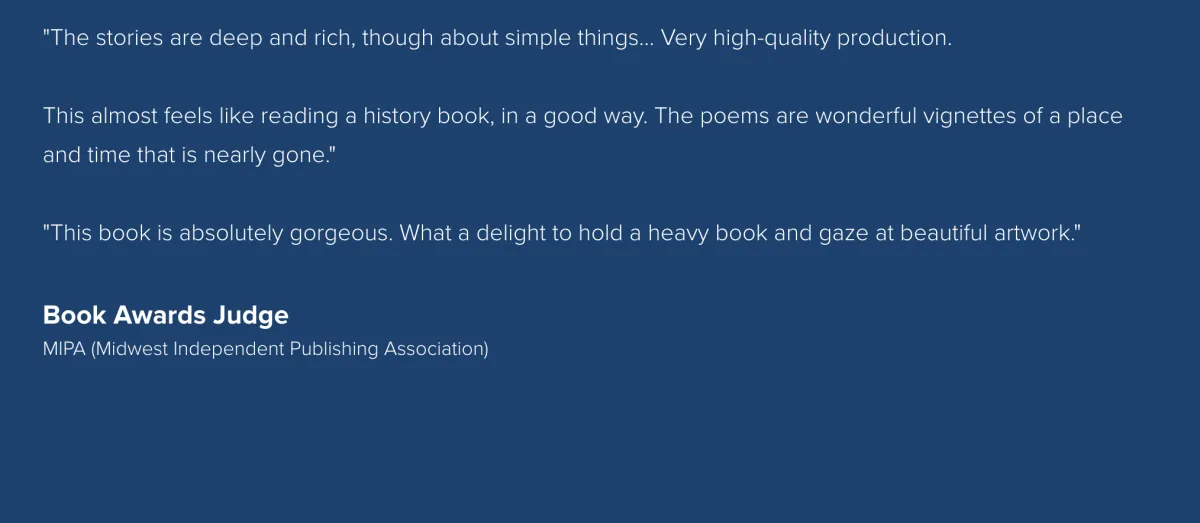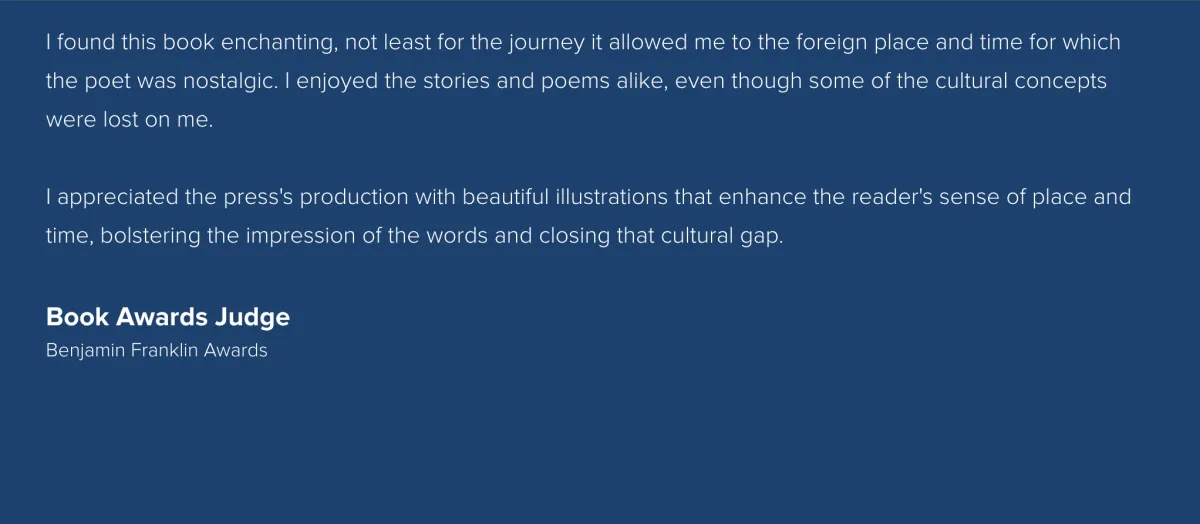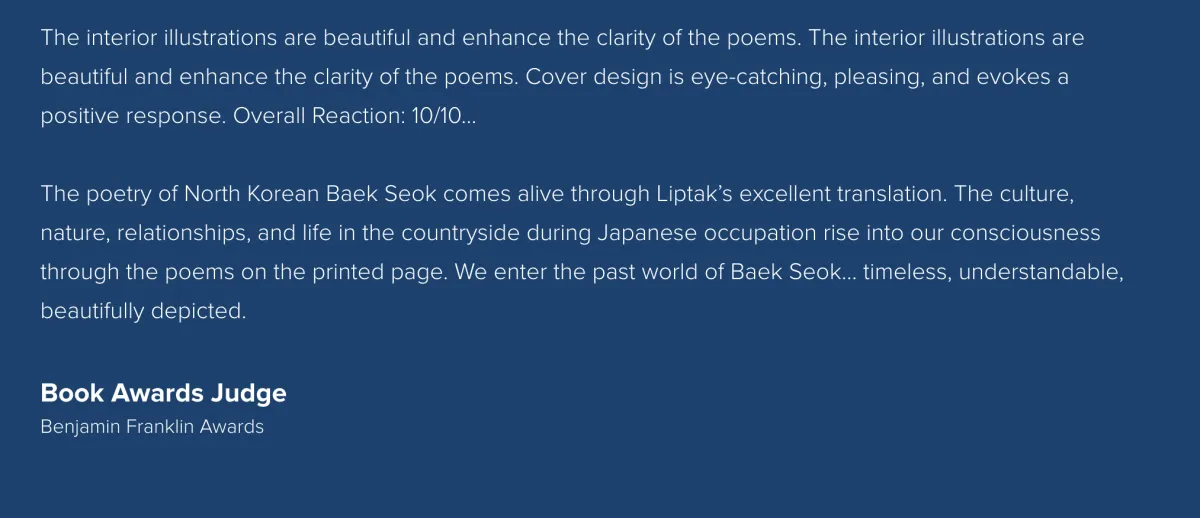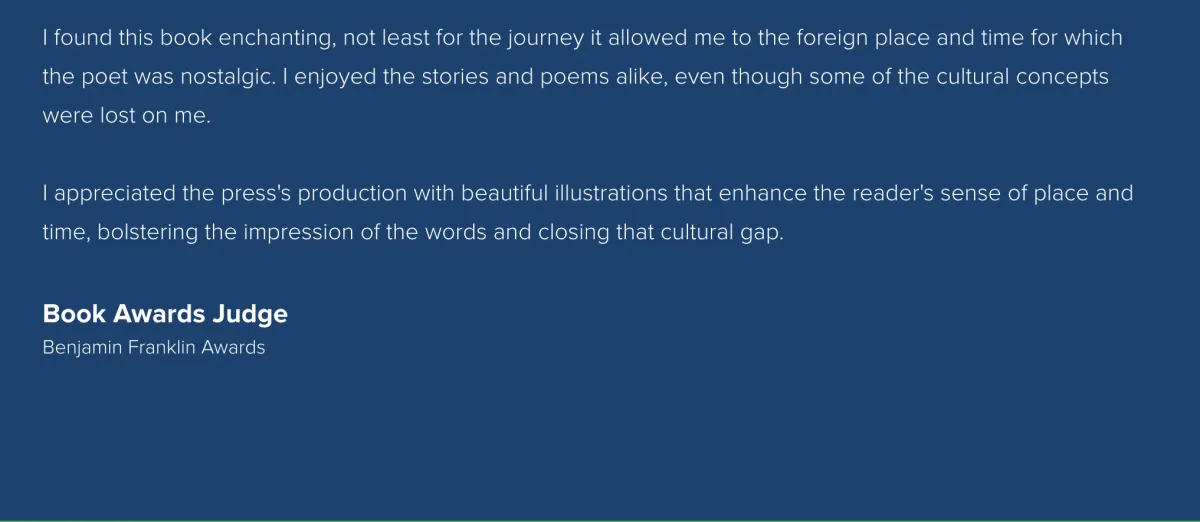What if you could travel back in time to a Korea
free from ideologic division, and united by a shared culture and spirit?

Discover the foods and fading customs of Korea and gain insight into the emotions and character of the people and their history through rich, vivid poetry that embodies the proud culture and customs of the North...
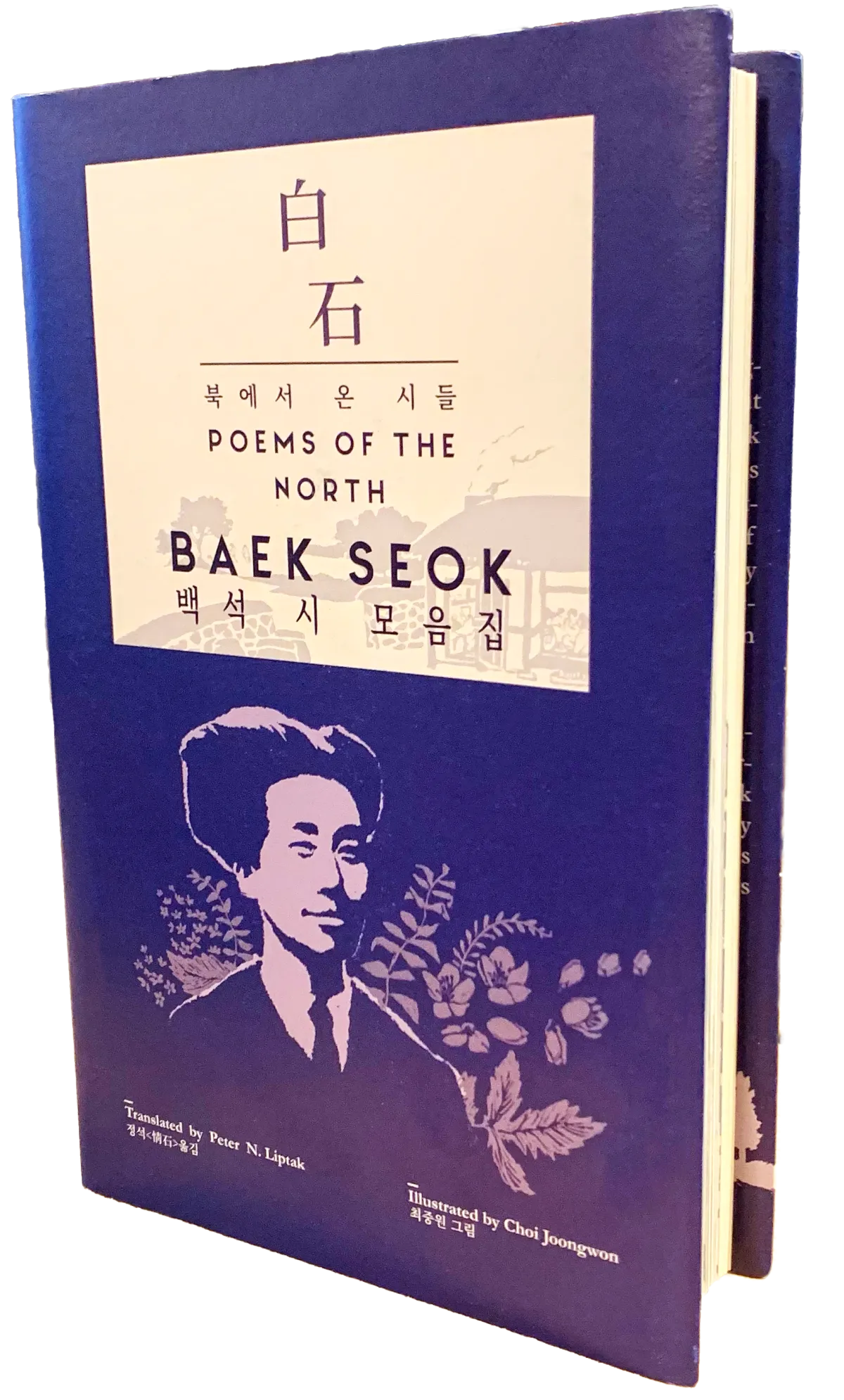
PROF YU JONGHO
President National Academy of the Arts
The unique temporal exoticism of Baek Seok’s poetry is exquisitely caught in this version. The pervading existential pathos & loneliness in his Manchu Poems never ceases to appeal. An unflinching outsider, the destitute poet at last came to find a reliable foreign fellow traveler.

BROTHER ANTHONY OF TAIZÉ
Professor Emeritus Sogang University
Simple celebrations of traditional rural life, tastes, smells, sounds of the countryside dominate the poems of this romantic, solitary figure. Anyone curious to discover a Korean poet who maintained a deep love for older Korean life-experience need look no further.

A valuable resource for anyone interested in Korean language and culture.
Baek Seok: Poems of the North 백석 시 모음집
A View Into the Lives and Culture of the People of North Korea
Treasured in both Koreas, Baek Seok: Poems of the North opens an intriguing gateway into the spirit of the North Koreans of the 1930's-50's. In a land struggling for freedom and short of food, he treats his readers to the dishes they craved, exhibiting a Korea not in mired in the unpleasant realities of oppressive Japanese occupation, but in his imagination of its greatness.
Influenced by the visually intense landscape objects & narratives of the countryside, this poet observed for us the institutions & character of fading local customs, infusing them with the foods & flavors native to Korea, a deep & spiritual connection to the natural world, & shamanic superstition while tapping into the memories & 'han' of the people.
With a tone that is variously meditative, joyous, nostalgic, critical, romantic, reverent, ironic, tragic & even bitter, Baek Seok's blend of litany, landscape & legend is full of nature's color, palatal flavors & a tactile connection to those who people his poems.This thoughtful 324 page hardcover translation of such rich, vivid poetry embodies the proud culture and customs of the North, making Baek Seok: Poems of the North an instant classic and valuable resource for anyone interested in Korean language and culture.
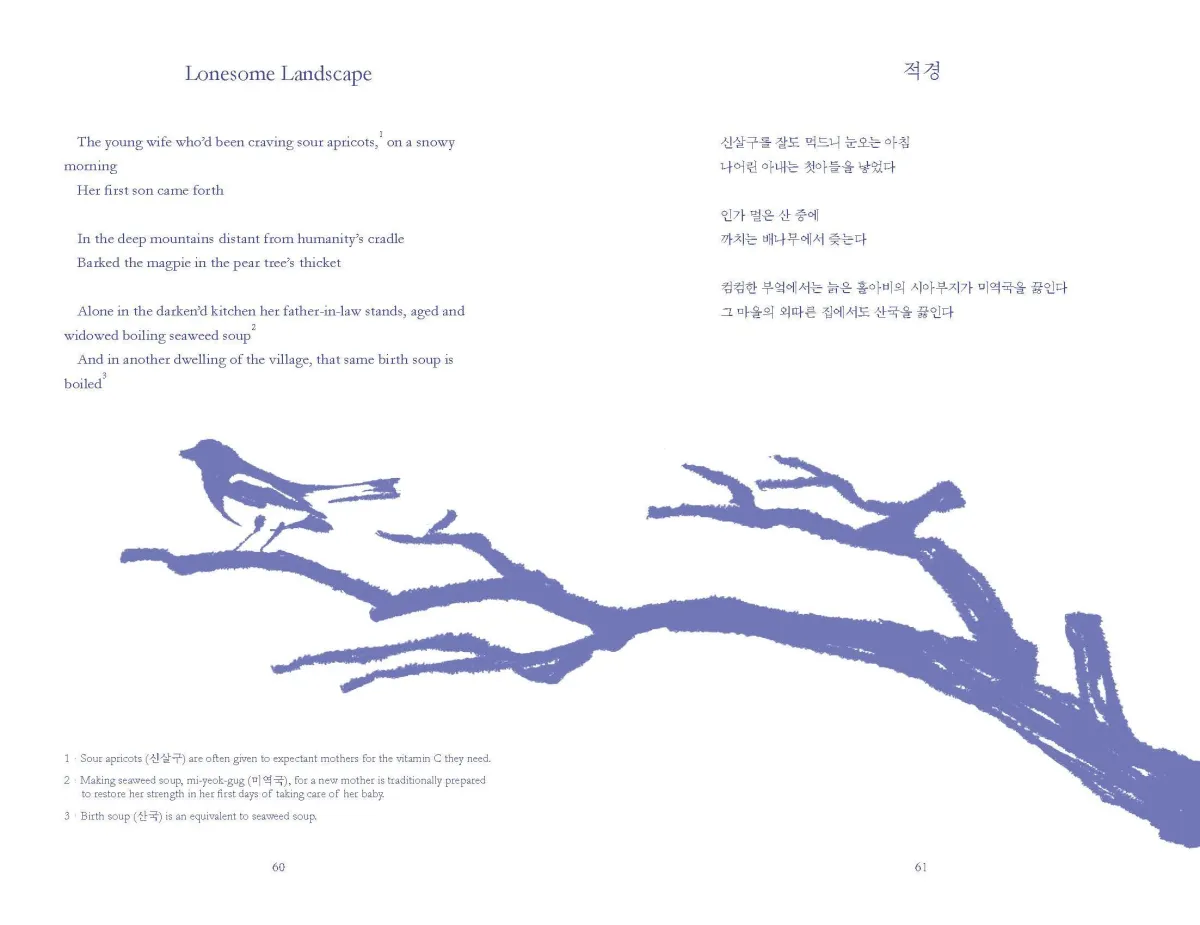
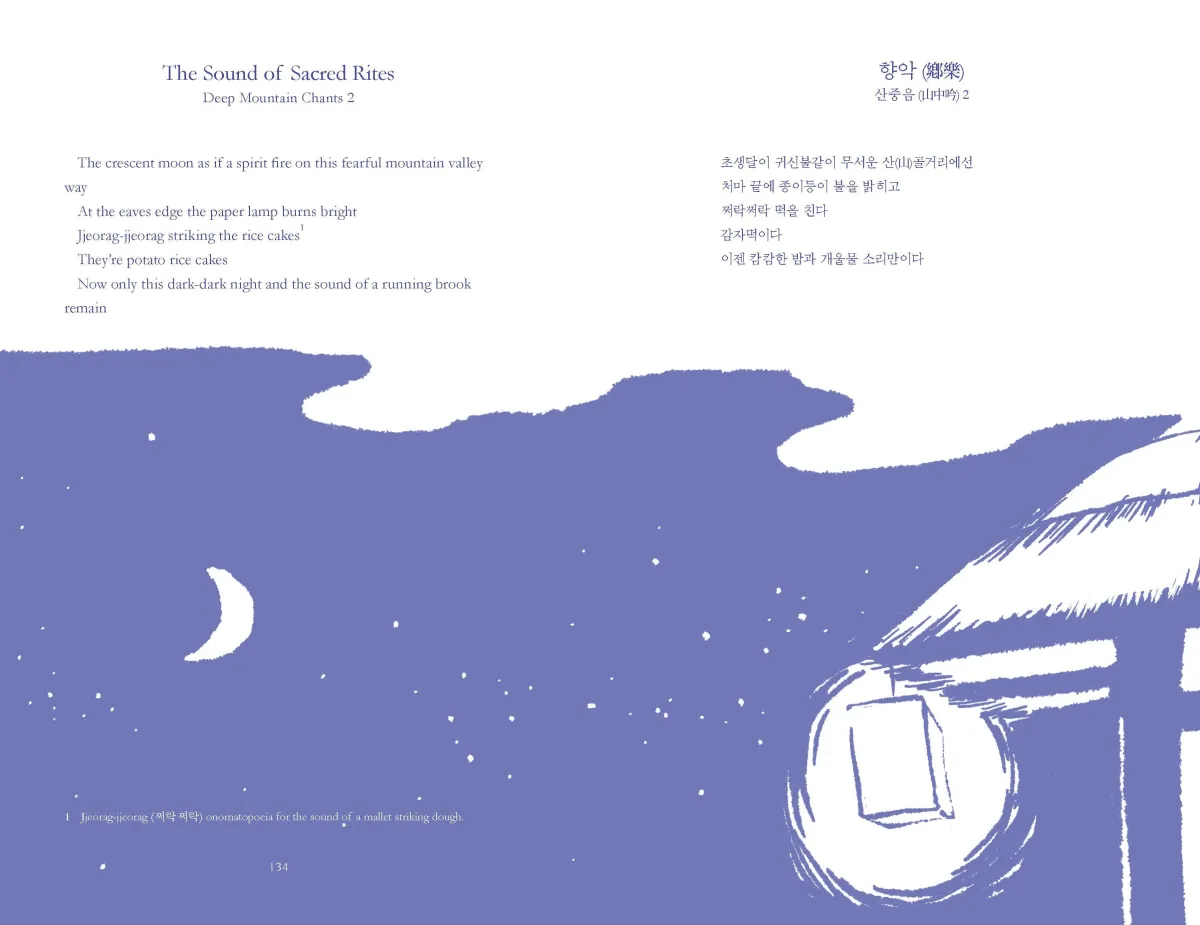
WITH YOUR ORDER OF MY BOOK (A $29 VALUE)
YOU WILL GET THESE BONUS ITEMS INCLUDED FREE
Ten Poems read by the Translator (and their original Korean as read by my Korean assistant)
A Scintilating Selection of Original Research Notes from the translation process
All the Onomatopoeia in the book in a fun pdf
A selection of Pristine Printable Postcards including original artwork and quotes from the book
TOTAL VALUE:
$25
$40
$15
$20
$129
Get your copy of Baek Seok: Poems of the North shipped to you, plus instant access to all of these bonuses - a $129 value for only $25 + 4.95 shipping!
WHY I WROTE THIS BOOK
When I was first exposed to Baek Seok, I felt an immediate connection to him and his words. This first poem was one of life's small misfortunes and the unrequited love of a wandering mind. This most Korean of Korean poets, his work both palatal and pastoral, who wrote of the objects connected with Korean traditional life inspired me to delve deeper. His intense descriptions were particularly poignant in relation to the backdrop of the Japanese occupation, the loss of Korea's nationhood and with it much of Korea's linguistic freedom and national character.
When the Korean war began in 1950, Baek Seok, who had remained in the North, saw his work forbidden in the milieu of staunch anticommunist sentiments that dominated in the South after the Korean war. Until 1988, his work was largely forgotten in the South, while in the North, he was forced to withdraw from writing and live out his remaining days as a farmer.
But with the current situation in North Korea, one might easily overlook the long and proud history, culture and traditions of the region. It is my hope that a brief glimpse at the people as they were, before the peninsula was torn in an ideological showdown, and as they are preserved in Baek Seok’s poetry will bring new light to the eyes of those who would judge the people of the Koreas.
Baek Seok gives us a rare glimpse into the everyday lives of the common people. These people of the Korean peninsula now divided, but sharing a long history of tradition, together hold the heritage that is much overlooked when viewing Asian contributions to world culture. And as such, it is my further hope that this publication may transmit a portion of that literary heritage on to the world community.
Perhaps it is from the present situation in which the world views North Korea that an evaluation of Baek Seok may do the most good. While so much of the press is focused Kim Jong Un and the Juche System of the North, whether it be nuclear proliferation, the Military First tactics of Kim Jong-un's government, the dire situation of the economy, or invoking pity for the hunger of the masses, one might easily overlook the long and proud history, culture and traditions of the entire peninsula or judge the North Korean people (still wishfully refered to as “our northern brothers” by many in the South) by their government’s actions or those who merely wish to understand what it is and was to be Korean.
In a country divided by war, politics & ideological schism, one grand master’s poems revive the beauty of Korea’s fading traditions & culture.
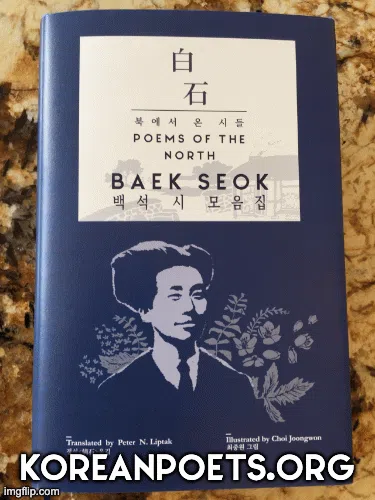
Dubbed the Great Untranslatable Poet for his use of North Korean dialect, Baek Seok gave voice to the distinctive culture of his people. This celebrated poet’s poems paint a timeless picture of Korea’s rich landscapes, traditions, & shamanic superstitions.
Baek Seok's poetry, painstakingly translated by Peter Liptak, provides a touching insight into the palatal & pastoral observations of this proud culture. Baek Seok: Poems of the North allows us to experience the human relationships & intense descriptions of a world now largely lost.
This thoughtful translation of rich, vivid poetry embodies the proud culture & customs of the North, making Poems of the North a valuable resource for anyone interested in Korean language & culture.
Buy Baek Seok: Poems of the North to experience the authentic traditions of Korea today!
Awards & Accolades for Baek Seok: Poems of the North

2018 INDIES Winner Silver, Multicultural (Adult Fiction)
chosen as a Foreword Reviews' prestigious #ForewordINDIES Book of the Year Awards winner!
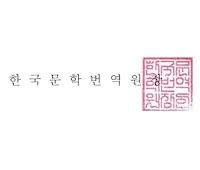
2014 Korean Literature Translation Institute
Translation and Publication grant
Select Reviews
Foreword Reviews Official Review
Revealing a hidden light of Korean poetry, the handsomely collected Baek Seok: Poems of the North shines with simple and universal splendor, set in the homes, yards, and farmland of twentieth-century Korea.
Peter Liptak applies his extensive skills and experience in English and Korean as he presents translations of the poetry of Baek Seok, who wrote his poems when Korea was occupied by Japan and was later split in two after World War II. Despite such turmoil, his poems focus on universal aspects of Korean culture: harmony with nature, family, love, and sadness. His work was rediscovered by modern scholars in 1987, and his growing reputation prompted this collection.
Baek Seok's poems carry a sense of nostalgia and community, delivered from an individual's point of view. Every line contributes to the whole, painting a picture in words. But Baek Seok's strength is his frugality, as seen in the poem "Green Persimmon," which creates an indelible image in just three lines:
On a night of countless stars
To the cool current of a north wind
The persimmon fell green to a dog's harsh bark.
One can contemplate deeper meanings or accept the poem at face value; either way, the strong sense of place and vivid imagery that are omnipresent in Baek Seok's work are evident.
Each poem is printed in English and Korean, accompanied by footnotes explaining references to specific locations, Korean terms, and other details. Choi Joongwon's exquisite artwork illustrates scenes in the book's color scheme of blue and white.
It's hard to imagine a better introduction to Baek Seok's work. A biographical timeline and "About the Author" section provide valuable context, while those more interested in the work itself will delight in the "List of Onomatopoeia," a technique used extensively by Baek Seok.
With Baek Seok: Poems of the North, Liptak has proven wrong the professor who called Baek Seok "The Great Untranslatable Poet"; in doing so, he has performed a great service to Western readers.
~ Peter Dabbene, Foreword Reviews
IN THE PALATAL POEMS OF BAEK SEOK, YOU WILL LEARN:
North Korean poetry reveals the real country, the traditions of the people, and a compelling narrative of pride and survival.
This uniquely Asian collection of poetry reveals a country life through tastes, smells, and pastoral culture.
Poems of the North demonstrates the master poet's striking narratives and romantic, pastoral observations.
Exotic culture, exploring foreign customs, and rich, vivid poetry mark the poems of Baek Seok's landscape of poems.
Are you ready to be transported to an entirely foreign place and time?
The Palatal Poems of Baek Seok
This poet from Pyungangbukdo observed for us the institutions and character of fading local customs, infusing them with the foods and flavors native to Korea, a deep and spiritual connection to the natural world, and shamanic superstition.
With a tone that is variously meditative, joyous, nostalgic, critical, romantic, reverent, ironic, tragic and even bitter at times, Baek Seok’s blend of litany, landscape and legend is full of nature’s color, readily palatal flavors of rural cookery and an “almost tactile connection to those who people his poems,” allowing us to experience his intense descriptions of a world now largely lost and to see into the culture and human relationships of the Korean condition.
From his earliest work, Deer <사슴> to his later poems, this collection from celebrated North Korean poet, Baek Seok, whose poems originate extensively from a united Korea suffering under the weight of the Japanese occupation, paints a picture of the Korean countryside that is timeless in its application to her rich past of traditions, allowing us to experience his intense descriptions of a world now lost and to see into the culture and human relationships of the Korean condition.
⭐ ⭐ ⭐ ⭐ ⭐ Beautiful Edition
~ by Donald Keddie
This collection of Baek Seok’s poetry is filled with loving details & careful work.
First of all, the art is lovely. I especially loved the little spider dropped on the page as if it had just slipped out of the poem!
Second, the introduction & the abstract at the beginning really added to my understanding of this poet and the index of onomatopoeia at the back was an extra piece of poetic detail that enhances the experience of the reader.
This is not a translator who lacks sensitivity to the sounds & images of the original.
Third, it is always a big bonus to have not just the English translation, but the original Korean poem next to the translation so I could pick up on the sounds of the Korean words & the actual word choices & compare them to the translation. Frequently, Korean poetry translations save money & space by skipping the originals which means you need to buy a second book to compare the originals. They didn’t cut corners here. It’s an edition you can study deeply if you wish.
Fourth, this is poetry that both feels more purely Korean in its imagery & language than other Korean poetry, & more universal in its poetic sensibility through its focus on pastoral life & domestic scenes.
Baek Seok is a North Korean poet, but his poetry is not dominated by ideology. He represents a less political, unified Korea, before the division of capitalism & communism. There is less of what weighs down the South Korean poets & no trace of the North’s ideological concerns. Perhaps that is why he would eventually find himself denounced & in an enforced retirement from writing poetry in the North.
Also there is less of that oppressive weight of Japanese colonialism hanging over his poems, even though their very existence makes a political statement against Japanese.
This is beautiful poetry. The kind of poetry I want to read in any language. And this edition evinces tender care & loving respect for its master poet on every page.
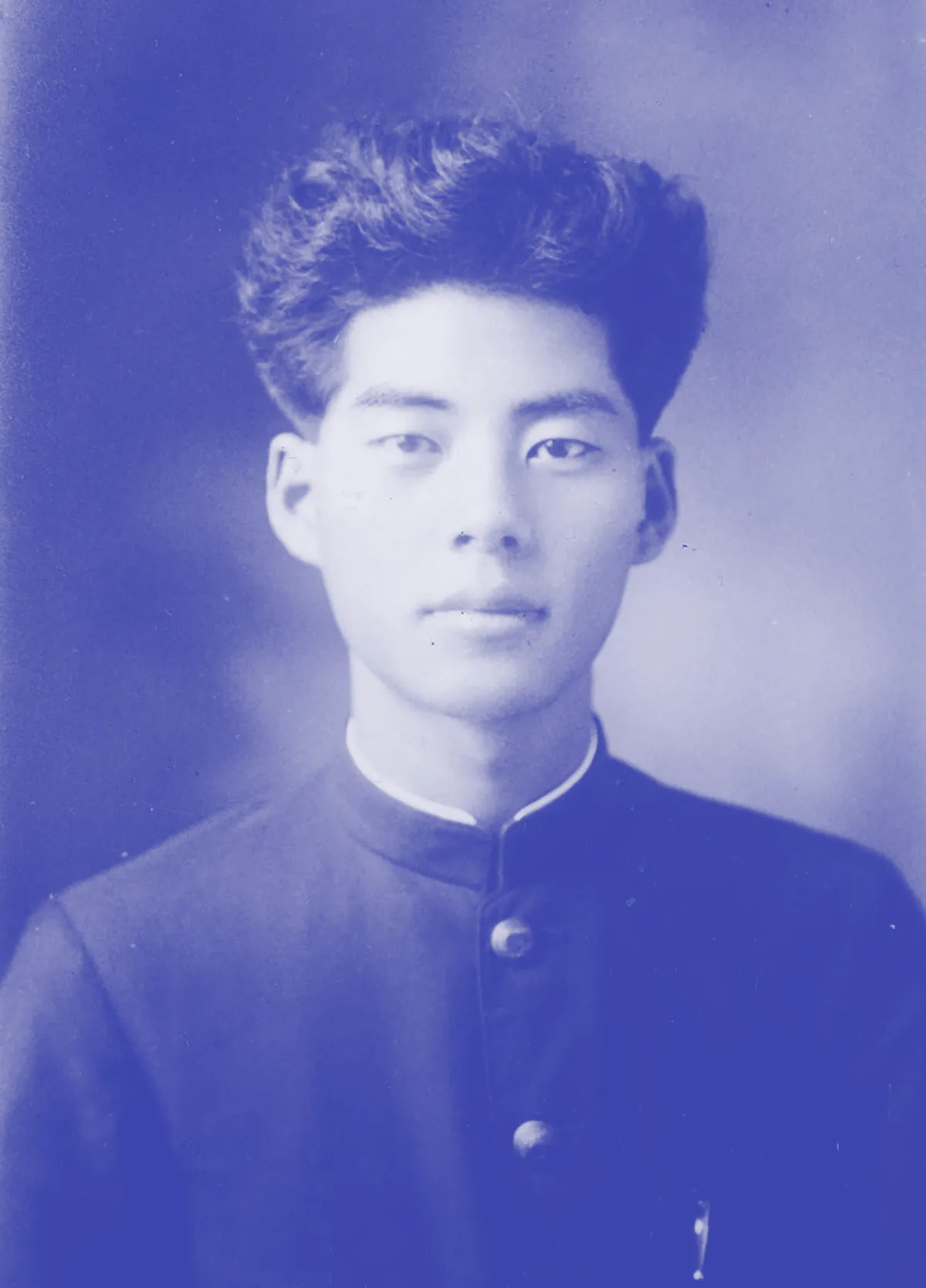
About the Author
BAEK SEOK 백석 (白石 also 白奭) ~ A POET OF THE KOREA BEFORE THERE WAS A NORTH OR SOUTH
Born July 1 , 1912 as 백기행 (白夔行) Baek Gi-haeng, Baek Seok was the first Korean poet to pen poems in prose. Widely considered one of the founding fathers of modern Korean poetry, he wrote poems steeped in Korean history and tradition, sensuousness and the harsh beauty of the Korean countryside.
Describing in detail the Korean foods, drinks and rice cakes of seasonal feasts from his childhood, as well as themes from his parents' home in and village. All were nostalgic and evocative of the tastes, fragrances and colors of the country's past.This poet from Pyungangbukdo observed for us the institutions and character of fading local customs, infusing them with the foods and flavors native to Korea, a deep and spiritual connection to the natural world, and shamanic superstition.
With a tone that is variously meditative, joyous, nostalgic, critical, romantic, reverent, ironic, tragic and even bitter at times, Baek Seok’s blend of litany, landscape and legend is full of nature’s color, readily palatal flavors of rural cookery and an “almost tactile connection to those who people his poems,” allowing us to experience his intense descriptions of a world now largely lost and to see into the culture and human relationships of the Korean condition.From his earliest work, Deer <사슴> to his later poems, this collection from celebrated North Korean poet, Baek Seok, whose poems originate extensively from a united Korea suffering under the weight of the Japanese occupation, paints a picture of the Korean countryside that is timeless in its application to her rich past of traditions, allowing us to experience his intense descriptions of a world now lost and to see into the culture and human relationships of the Korean condition.
About the Translator
TRANSLATED BY PETER N. LIPTAK 情石 (정석)
I came to Seoul in 1995 where I lived and worked for 20 years, finding in Korea a source of inspiration, linguistic and otherwise, I began studying Korean at Ewha Woman’s University and later at Seoul National University.
Later, as cohost of the show Explore Korea I gained a greater appreciation of the country and its history. A dearth of interesting study materials at the time led me to begin examining Korean poetry as a way of expanding my understanding of the language and people. As a poet myself, I discovered something akin to my own development in the early modernist movement of Korean poets, especially in the fervent times of the Japanese occupation and began an MA in Korean Studies at Yonsei University’s Graduate School of International Studies where I was first introduced to the palatal poems of Baek Seok.

I've penned other books as a poet, author, teacher and publisher, but continued to return to the simple beauty of Baek Seok’s poems and the slow process of decoding them. When I resolved to tackle the task of translating Baek Seok’s poems, I began the journey with the simple impetus of an appreciation of his work and wish to understand it, but more so due to some mysterious connection I felt to the innermost ramblings of his mind, a sort of jung had developed that linked me to his work. After embarking on this 15 year journey, I began to understand the depth of Baek Seok’s contributions to the development of modern Korean poetry and the collective consciousness of the Korean condition overall.
Jung (정) is an affection, closeness or bond that builds between people over time.
GUARANTEED TO BE THE MOST INSPIRING BOOK OF NORTH KOREAN POETRY YOU'VE EVER READ
If you're at all interested in learning about the people of North Korea and by extension of all Koreans through an intmate glimpse at their culture and poetry, I guarantee this book is for you...
It will tease you with a taste of what it is to live the countryside under the Japanese occupation and in post colonial Korea, peak your interest, then satiate it with that litany of foods and festivals that pepper the Korean experience in a sort of ethnographic time machine.
CLAIM YOUR BOOK NOW. YOU'LL THANK ME LATER!
What you're getting today:
A Deep Dive into Korean Poetry
And Life in North Korea during the Japanese occupation as the People tried to hold on to their way of life.
A glimpse into the fading customs of Korea
A beautifully-illustrated book of early-modernist Korean poetry
Side-by-side English & Korean translations for easy comparison
An important piece of early 20th century Korean literature at your fingertips
An intimate view into the daily lives of 1930s-50s Korean people
A palatal & pastoral tour of Korean foods, flavors & customs
324 pages of thought-provoking cultural vignettes
